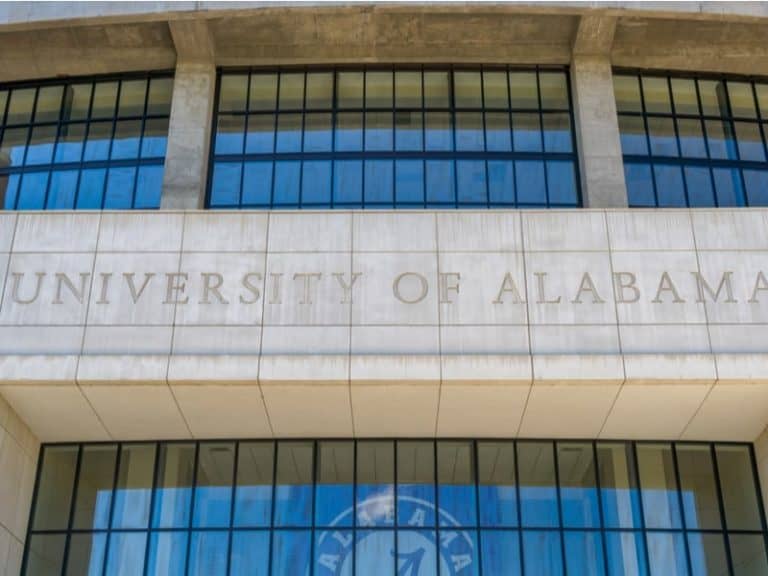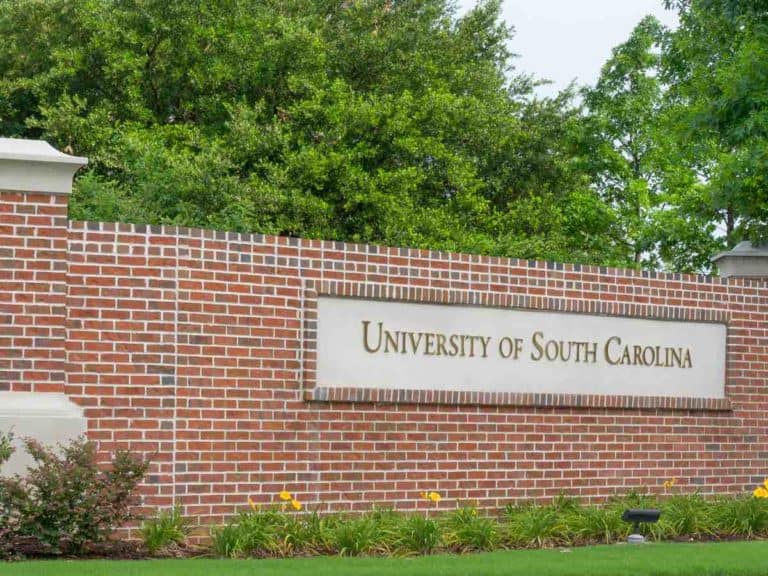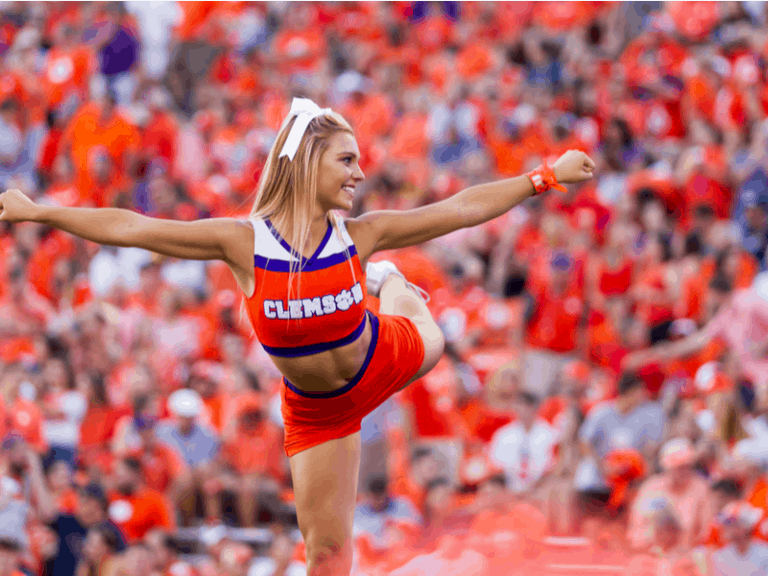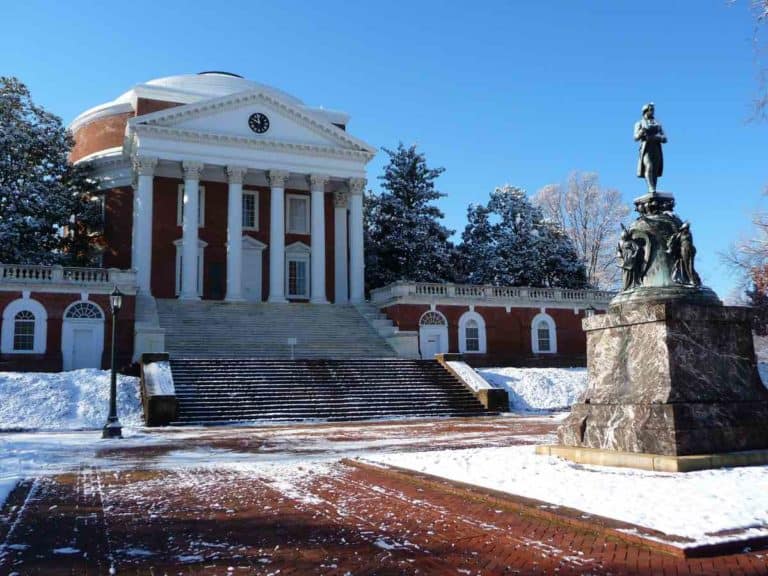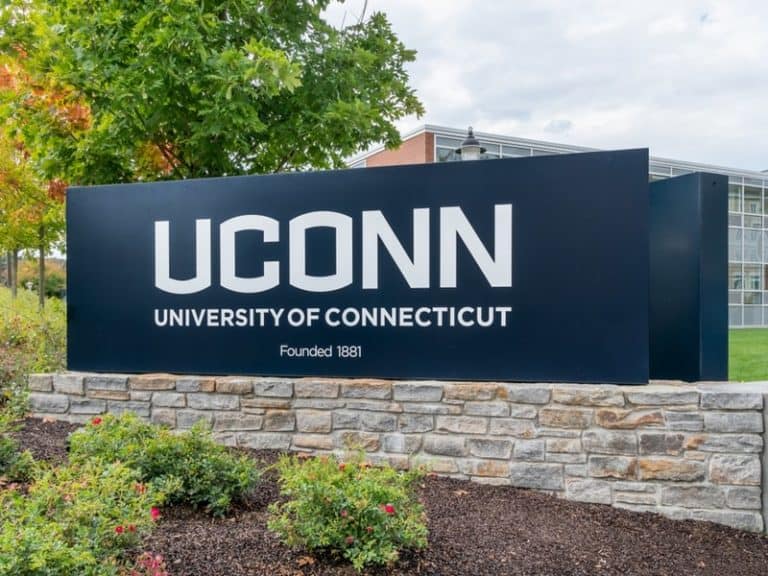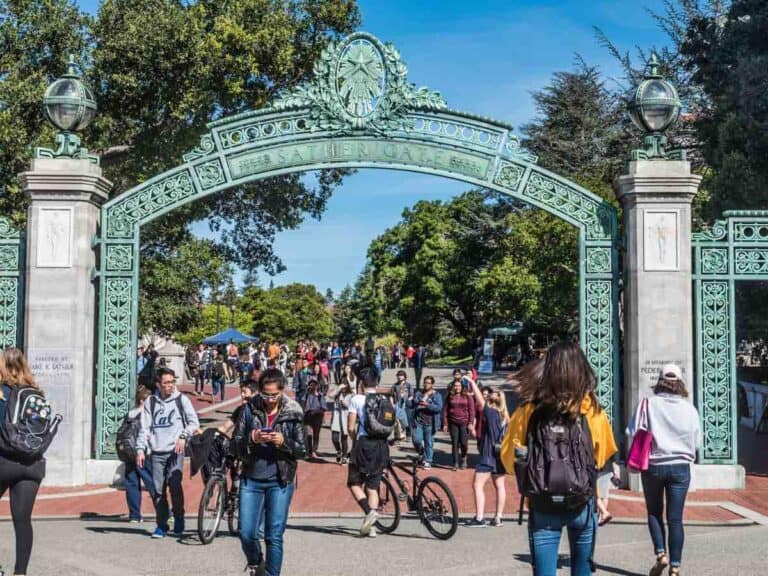Is Ball State a Good School? College Spotlight
Some colleges shine more in academics. Others shine more in campus life.
Ball State University is a prime example of those that shine in both aspects. Located in Muncie, Indiana, it’s a public research university with a Carnegie R2 designation for its high research activity.
It is an excellent choice for adult learners with busy careers or families. That’s because it offers 100+ online programs that students can complete 100% via the internet.
Are you searching for a dependable program in business, nursing, or computer science?
Consider going to Ball!
It is known, too, for being one of the best party schools in Indiana, making it an ideal choice for partygoers.
Greek life, sports, study-abroad programs, internships, a diverse campus — you name it, BSU has it!
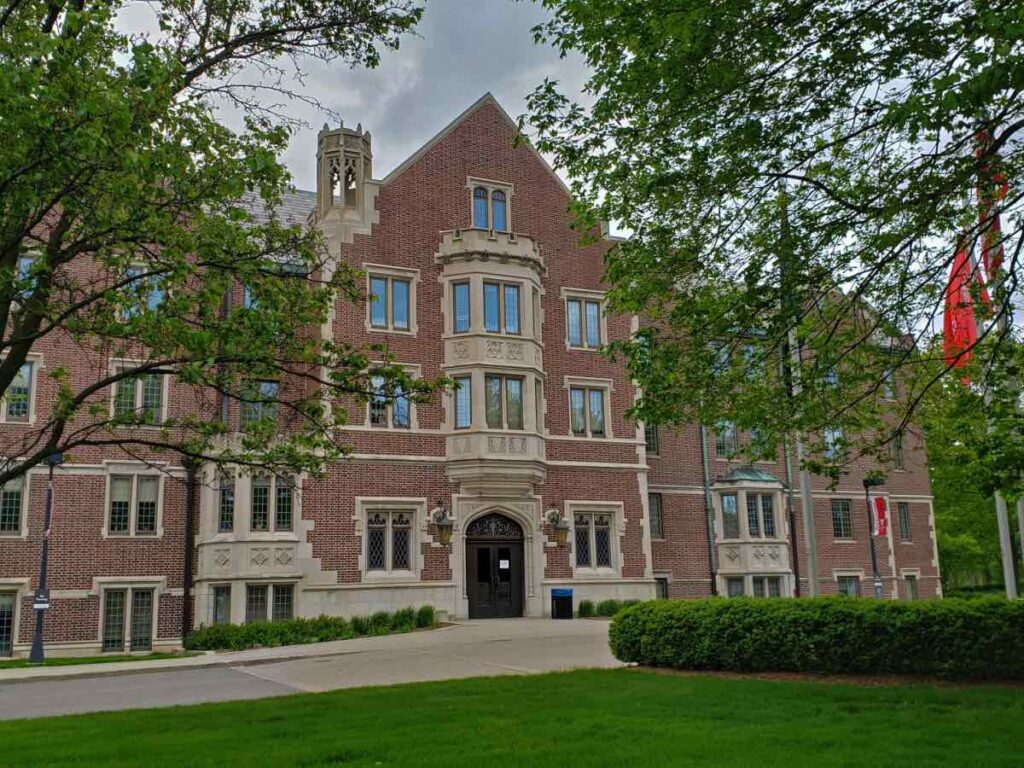
Let’s Get the Ball Rolling With Academics
US News ranks Ball State #216 in National Universities and #116 in Top Public Schools.
Some of its highly-ranked undergraduate programs include:
- Business
- Computer Science
- Nursing
- Psychology
You’ll Have a Ball Choosing From 100+ Majors
Undergraduate students can choose from around 120 majors across eight schools.
After completing two semesters, you will move from having a first-year advisor to an academic advisor. An academic advisor is someone who can help you declare a major.
The said individual is also someone who can help you with switching majors.
Some of the top majors are the following:
- Business
- Marketing
- Communication
- Journalism
- Education
- Visual and Performing Arts
- Psychology
- Liberal Arts and Humanities
- Nursing
- Social Sciences
- Biological Sciences
- Homeland Security
- Parks and Recreation
You may also approach your assigned academic advisor when adding a minor.
There are over 130 minors to choose from. Each option can complement specific majors, align with your academic and career goals, and match your interests.
I find the following minors at State quite interesting:
- Digital Forensics
- Journalistic Storytelling
- Music: Sacred (Organ, Voice)
- Professional Selling
- Scuba
- Six Sigma
- Workplace Wellness
Top-Paying Majors: What You Declare Can Impact Your Earning Potential
Graduates of Ball State make an average of $33,300 annually six years from initial enrollment.
On average, they earn approximately $42,500 per year after ten years.
Some of the highest-paid alumni members majored in business- and healthcare-related areas. The same applies to individuals with education concentrations, such as teaching those with autism or multiple disabilities.
Here are some of the top-paid graduates based on their chosen majors:
| Major | Yearly Earnings |
|---|---|
| Management Sciences and Quantitative Methods | $60,900 |
| Registered Nursing | $55,400 |
| Nursing Administration | $55,400 |
| Management Information Systems and Services | $53,100 |
| Computer and Information Sciences | $51,900 |
| Industrial Production Technologies | $50,500 |
| Accounting | $46,000 |
| Landscape Architecture | $45,100 |
| Finance and Financial Management Services | $42,600 |
| Business Administration | $41,600 |
| Management | $41,600 |
| Marketing | $35,200 |
| Teacher Education and Professional Development | $35,200 |
| Criminal Justice and Corrections | $35,000 |
| Commerce | $34,800 |
| Public Relations | $34,300 |
| Advertising | $34,300 |
| Architecture | $34,200 |
| Journalism | $33,100 |
| Health and Physical Education | $32,400 |
| Communication | $32,000 |
| Media Studies | $32,000 |
| Geography and Cartography | $31,800 |
| Family and Consumer Sciences | $31,300 |
| Social Work | $31,300 |
| Sociology | $31,200 |
| Music | $30,800 |
| Political Science and Government | $30,600 |
| Liberal Arts and Humanities | $30,000 |
Up to 95% of those who went to State get employed two years after graduation. Around 94% of those believe the career center helped them get hired.
Meanwhile, about 84% of current students are confident they will find a job after graduation.
More Degrees Conferred Than Average
Around 73% of first-time, first-year college students return the following year to continue their studies.
Ball State’s retention rate is lower than average. According to the National Center for Education Statistics (NCES), the average retention rate is 82% for public universities in the United States.
There are various possible reasons for a low retention rate, and they include:
- Poor academics
- Limited campus resources
- Inadequate student support
- Poor student-faculty relationship
- Limited extracurricular opportunities
- Lack of or insufficient financial aid programs
The graduation rate, meanwhile, is 68%.
While that’s a lower figure than its retention rate, that’s actually above average. The average six-year graduation rate for public institutions in the country is 63%, NCES says.
Degree Programs You Can Complete Online 100%
More than 100 online programs are available at Ball State.
They include certifications, associate degrees, bachelor’s degrees, master’s degrees, and doctoral and specialist degrees. There are also licenses for educators and graduate certificates.
Among the online bachelor’s degree programs are the following:
- Accounting
- Applied Behavior Analysis
- Applied Cybersecurity
- Business Administration
- Computer and Information Technology
- Criminal Justice and Criminology
- Early Childhood Education
- Economics
- General Studies
- Logistics and Supply Chain Management
- Registered Nurse to Bachelor of Science (RN to BSN)
- Social Work
BSU provides online programs that students can complete entirely virtually.
Degree-seeking adult learners tending to their professional careers or looking after their respective children will find programs that are 100% online are perfect for them.
Study-Abroad Programs: Learning Outside the Country
Undergraduate students at BSU have the opportunity to study abroad. Doing so enables them to learn about intercultural issues outside the classroom and the United States.
Programs for those who like to study elsewhere can choose from various programs.
Some study-abroad programs are on a per-term basis; others are on a per-academic year basis. Either way, they can also vary according to type, such as which faculty members lead the program.
For instance, Ball State’s faculty members are the ones who administer faculty-led ones.
Below are some of the countries where you may study:
- Australia
- Austria
- China
- Croatia
- Czech Republic
- Egypt
- Fiji
- France
- Germany
- Greece
- India
- Ireland
- Italy
- Japan
- Morocco
- Namibia
- Netherlands
- Spain
- Switzerland
- UK
It’s worth pointing out that all study-abroad programs available offer credit.
Participating in any of them won’t likely delay your graduation for as long as you plan your schedule very well. So, in other words, you can earn your degree and start your career on time.
Building a Network and Work Experience Through Internship Opportunities
Ball State has a Career Center that allows students to find internship programs that suit them.
It is a wonderful idea for undergraduate students to begin the internship process during the summer between their junior and senior years of college. Getting started during your first year is possible, too.
Internships at BSU come in two forms:
- Credit-based internships
- Non-credit internships
Credit-based internships allow students to earn credit toward their bachelor’s degrees. They usually last anywhere from 10 to 16 weeks or an entire semester.
On the other hand, non-credit internships do not allow students to earn any credit.
Non-credit internships can vary in length, usually several months. Typically, how long a non-credit internship lasts is at the discretion of the employer and the student under the program.
Whether credit or non-credit, participating in an internship program lets you enjoy these perks:
- Gain valuable real-life experience
- Build a professional network
- Determine whether or not you are in the right career path
Small Classes, Big Number of Faculty Members
Almost 40% of classes at BSU have 10 to 19 students.
On the other hand, around 13% of classes have only two to nine students, while some classes have as many as 100 students or more — approximately 3% of them do.
The total number of instructional faculty members is 1,225. Of those, nearly 80% are full-time.
Meanwhile, the student-to-faculty ratio is 15:1.
Fully Accredited: Ball’s Not Just Another Diploma Mill
Ball State University has accreditation from the Higher Learning Commission (HLC).
HLC is one of the few regional accrediting agencies in the United States. So, in other words, Ball State has regional accreditation, which is considered more prestigious and widely recognized than national accreditation.
Besides institutional accreditation, it also has various programmatic accreditations.
Here are some examples of academic programs that are accredited:
- Accounting
- Architecture
- Counseling Psychology
- Dietetics
- Interior Design
- Journalism
- Nursing
- Public Relations
- Urban Planning
- Visual arts
Let’s answer a question many college-bound teens and adult learners want to ask:
Is Ball State a Diploma Mill?
Ball State is not a diploma mill. It has accreditation from an organization that the US Department of Health and the Council for Higher Education Accreditation (CHEA) recognize.
The online degrees it confers have value and are legitimate. It means employers and graduate schools alike accept bachelor’s degrees students earn.
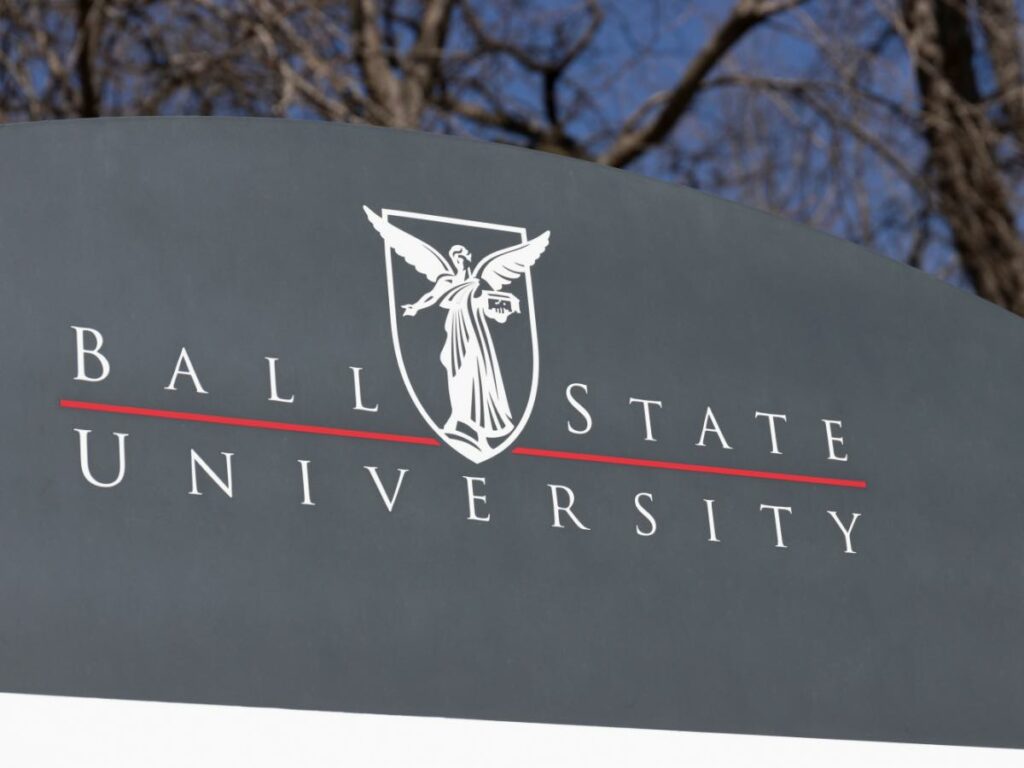
Life’s a Ball: What It’s Like to Study at BSU
There are 14,416 undergraduate students at Ball State University.
Of those:
- 88% are attending full-time
- 12% are attending part-time
- 39% are male students
- 61% are female students
- 24% are first-time, first-year students
A Massive Campus With a Massive Food Court
Its campus, which has a suburban setting, is 1,282 acres big.
There are more than 100 buildings on its campus. They include several residence halls, the Teachers College Building, and the Whitinger Business Building, where the Miller College of Business is.
Regarded as the central hub of on-campus activities is The Atrium.
This spot in the Art and Journalism Building is famous for having a 400-seat food court. There’s an outdoor courtyard and many food establishments, including two national chains.
Let’s answer the following question many students and their parents have in mind:
Is Ball State’s Campus Safe?
BSU prioritizes the safety and security of its students by implementing programs and resources.
The University Police Department is one of those. It also publishes annual security and fire safety reports that disclose campus crime stats, alcohol- and drug-related incidents and emergency response procedures.
On-campus residents can rely on the Office of Housing and Residence Life to provide safety and clear guidance on prohibited activities and policies.
A Shot at Diversity Through Inclusivity
Ball State has what’s referred to as Inclusive Excellence.
It is the commitment to respecting and embracing equity, inclusion, and diversity in students and their opinions and ideas. Such involves roundtable discussions with teachers, graduates, and local community members.
The most recent plan entails recruiting, supporting, and retaining a diverse population.
However, it’s important to point out that the campus is still predominantly white, although there is a strong presence of minority and underrepresented group members.
Below are the percentages of undergraduate students by race or ethnicity:
- White: 75%
- Black or African American: 9%
- Hispanic or Latino: 7%
- Two or more races: 4%
- Unknown: 2%
- Asian: 2%
- American Indian or Alaska Native: <1%
- Native Hawaiian or Pacific Islander: <1%
Extra Many Extracurricular Options
More than 400 student clubs and organizations are around. Most are groups committed to identity and culture, which supports BSU’s commitment to having a more diverse campus.
Numerous benefits come with participating in college associations like:
- Pursuing one’s interests
- Developing new skills
- Meeting new people
- Creating a professional network
- Improving the resume
- Having an outlet from classes
Encouraging students to participate in extracurriculars is the Benny Link.
It helps students find the right groups and campus events for them. So, in other words, Benny Link serves as a calendar of all events and activities that attendees may find valuable and engaging.
BSU also allows students to seek funding for the clubs and organizations they create.
Its Housing Options Got You Covered
All students are required to live in university housing for two semesters.
They can choose between residence halls and university apartments.
There are 11 residence halls on campus, while the apartments, which come in five types of floor plans, are located outside the campus.
Up to 90% of students reside in college-owned, -operated, or -affiliated housing.
Nearly 70% of students living on campus agree that the overall college dorm quality is excellent. They also share the common sentiment that the college dorm social atmosphere is great.
Some of the criteria to meet that allow you to reside elsewhere include:
- Living with your parents or guardians within a 60-mile radius of campus
- Being enrolled in fewer than nine semester hours
- Turning 21 years old before the first day of classes of the first semester
- Married
- Custodial parent of a dependent child
Let’s Play Ball: What Athletic Life is Like
The Ball State Cardinals are the athletic teams that represent BSU.
There are 18 varsity teams. More than 490 student-athletes compete, particularly in the NCAA Division I Mid-American Conference (MAC), of which BSU is a member.
Here are the number of MAC championships that the Cardinals have won as of this writing:
- Men’s tennis: 38
- Men’s volleyball: 38
- Women’s volleyball: 30
- Field hockey: 25
- Men’s basketball: 19
- Baseball: 16
- Softball: 15
- Football: 10
- Women’s basketball: 9
- Soccer: 7
- Women’s tennis: 7
- Women’s outdoor track and field: 5
- Women’s indoor track and field: 5
- Men’s golf: 3
- Gymnastics: 2
- Men’s cross country: 2
- Women’s cross country: 1
Keep Your Eye on the Ball as You Party
Ball State has a reputation for being a party school.
Forum participants say that they see drunk teens everywhere as the weekends near and over the weekends, too. Also, around 46% of students confirm that there are lots of party options from Wednesday to Saturday.
True enough, Niche ranks BSU #3 in Top Party Schools in Indiana (out of 40 surveyed institutions).
However, its Niche ranking drops when all party colleges and universities in the nation become a part of the whole picture. It’s #131 in Top Party Schools in America (out of 1,512 surveyed institutions).
Some of the biggest on-campus parties are the following:
- Homecoming
- Halloween
- Welcome Week
- Late Nite Carnival
Greek Life: Almost a Fourth are Frat and Sorority Members
There are more than 30 fraternities and sororities around.
Three councils collaborating with BSU’s Office of Fraternity and Sorority Life govern all Greek-letter associations on campus.
Around 15% of male students are frat members, while about 8% of female students are sorority members.
Niche ranks Ball State #3 in Best Greek Life Colleges in Indiana (out of 16 surveyed institutions). Indeed, it’s an ideal school for students who like to become members of Greek societies.
Refrain from assuming that a bustling Greek life might get in the way of your academic success.
Of course, as a fraternity or sorority member, you should know your priorities if you don’t want your grades to suffer and your career plans.
Besides, Ball State University says that members have higher GPAs, on average.
It adds that its frats and sororities raised over $2.4 million for charity!
Disclaimer: The views and opinions expressed in this article are those of the authors and do not necessarily represent those of the College Reality Check.
